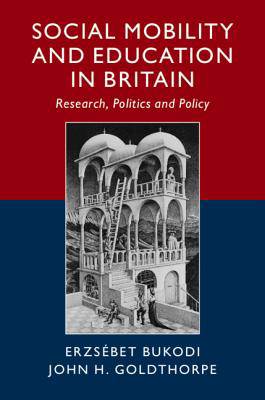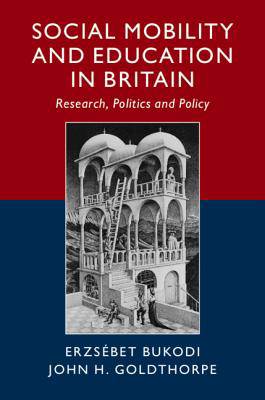
Je cadeautjes zeker op tijd in huis hebben voor de feestdagen? Kom langs in onze winkels en vind het perfecte geschenk!
- Afhalen na 1 uur in een winkel met voorraad
- Gratis thuislevering in België vanaf € 30
- Ruim aanbod met 7 miljoen producten
Je cadeautjes zeker op tijd in huis hebben voor de feestdagen? Kom langs in onze winkels en vind het perfecte geschenk!
- Afhalen na 1 uur in een winkel met voorraad
- Gratis thuislevering in België vanaf € 30
- Ruim aanbod met 7 miljoen producten
Zoeken
Social Mobility and Education in Britain
Research, Politics and Policy
Erzsébet Bukodi, John H Goldthorpe
Paperback | Engels
€ 56,45
+ 112 punten
Omschrijving
Building upon extensive research into modern British society, this book traces out trends in social mobility and their relation to educational inequalities, with surprising results. Contrary to what is widely supposed, Bukodi and Goldthorpe's findings show there has been no overall decline in social mobility - though downward mobility is tending to rise and upward mobility to fall - and Britain is not a distinctively low mobility society. However, the inequalities of mobility chances among individuals, in relation to their social origins, have not been reduced and remain in some respects extreme. Exposing the widespread misconceptions that prevail in political and policy circles, this book shows that educational policy alone cannot break the link between inequality of condition and inequality of opportunity. It will appeal to students, researchers, policy makers, and anyone interested in the issues surrounding social inequality, social mobility and education.
Specificaties
Betrokkenen
- Auteur(s):
- Uitgeverij:
Inhoud
- Aantal bladzijden:
- 260
- Taal:
- Engels
Eigenschappen
- Productcode (EAN):
- 9781108468213
- Verschijningsdatum:
- 13/12/2018
- Uitvoering:
- Paperback
- Formaat:
- Trade paperback (VS)
- Afmetingen:
- 155 mm x 227 mm
- Gewicht:
- 408 g

Alleen bij Standaard Boekhandel
+ 112 punten op je klantenkaart van Standaard Boekhandel
Beoordelingen
We publiceren alleen reviews die voldoen aan de voorwaarden voor reviews. Bekijk onze voorwaarden voor reviews.









